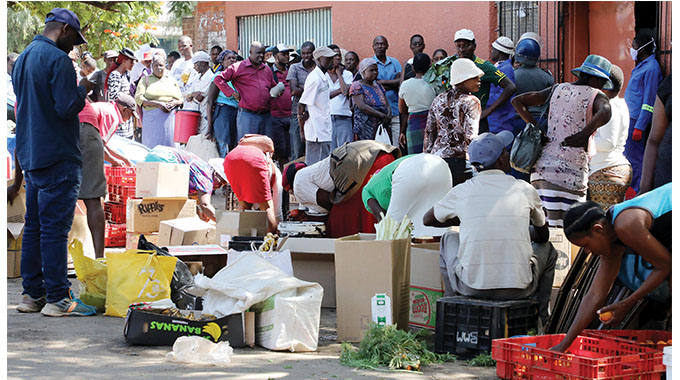
Sukulwenkosi Dube-Matutu, Gwanda Correspondent
FARMERS working in small irrigation schemes are facing challenges in selling their produce as they are failing to access markets due to the prevailing Covid-19 pandemic.
They are resorting to drying their output hoping to sell it later but most produce is simply going bad.
Small irrigation schemes have become a source of livelihood for many people in the rural areas. This season, most gardens in Gwanda District recorded a good harvest but farmers are failing to transport their produce to markets in the Gwanda CBD and Bulawayo.
Operations of most vendors in the Gwanda CBD have remained suspended thereby limiting the market for the farmers.
Mrs Cecilia Sebata, a member of Pelele Irrigation Scheme in Ntalale area Ward 11 said: “Our irrigation is 5,7 hectares and we have 81 members. This season we did well in terms of our produce. We have tomatoes, vegetables, sugar beans and onions which are now ready. We did well especially with tomatoes and in my space, I can get four buckets of tomatoes a day.
“The challenge we are now facing is accessing markets as I normally sell my produce in Gwanda and Bulawayo. I used to rely on buses and kombis to get my produce to my customers but at the moment we don’t have means of transportation as operations of most transporters have remained suspended. Our fellow community members do support our business but they buy mainly sugar beans. Our area is close to a river and therefore many people plant their own vegetables which leaves us with a limited market. People in the rural areas have a challenge in accessing money which makes their buying power low,” she said.
Mrs Sebata said they also supplied teachers from schools within the area but schools were closed.
“I have been collecting my green leafy vegetables and tomatoes and taking them home but I’m running out of storage space now. I have resorted to drying my vegetables (umfushwa) so that I minimise loss. I will then pack them and sell them at a later stage when the situation has improved. This situation has really affected us financially as we are in this business in order to make money,” she said.
Mr John Sibanda, the chairperson of Phaswana Garden in Ward 17 said they were operating a three-hectare garden which had 30 members. He said they recently harvested cabbage, tomatoes, chomolia, rape and onions. Mr Sibanda said villagers were buying their produce but they had too many tomatoes, which required a bigger market.
Mr Sibanda said they normally sell their produce in West Nicholson, Colleen Bawn, Gwanda CBD and Bulawayo and rely on buses and kombis for transportation.
“At the moment we are facing challenges in selling our produce especially tomatoes as we harvested a lot of them. Our first batch of tomatoes went bad before we could sell them. We normally sell to vendors in Gwanda but at the moment they are not operating. Some of our customers in Colleen Bawn and West Nicholson want the tomatoes but we don’t have means of delivering them. People in our community do support our business but we need a bigger market,” he said.
Matabeleland South Acting Provincial Agricultural Officer, Mr Mkhunjulelwa Ndlovu said this year the province recorded good produce from horticulture. He said during seasons where cereal production was not good, farmers tend to focus more on vegetable production.
“Farmers are facing a challenge in accessing markets because of inflation. The majority of them are selling their produce in rands making it difficult for the rural folk to buy. Some farmers are facing challenges in transportation. Farmers across the province generally did well in spinach, onion, carrots, tsunga, rape, chomolia and cabbage. Those who managed to beat the frost produced a lot of tomatoes,” he said.- @DubeMatutu.
